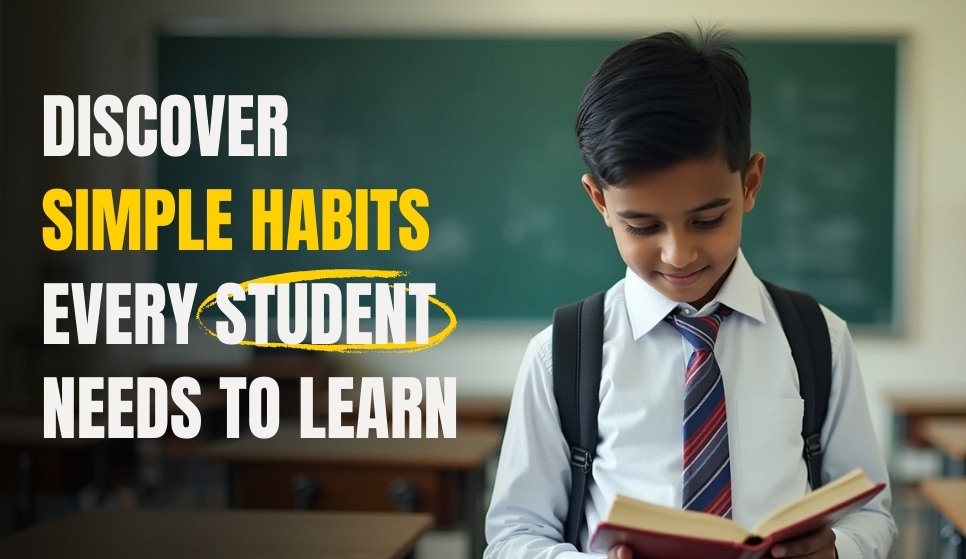Introduction:
As the world advances, we are discovering new resources that we can utilize in our day-to-day lives. Still, we are also losing many important natural resources that are currently in use, such as trees, fossil fuels, and various species of plants and animals.
To conserve these resources for future generations, we must take steps that will help preserve society and the future of the generations to come.
However, to save the future generations, we must first educate today’s youth about how eco-friendliness works so that they choose the correct path while growing up, while having a sustainable approach towards society.
In this blog, we will discuss some eco-friendly habits that every student should learn and can start even today.
Why Eco-Friendly Habits Matter for Students
Students learning in schools are the future of our society, and to save resources for themselves, they should learn habits that will come in handy to them.
Eco-friendly habits come with environmental, social, and even financial benefits, like saving the trees for fresh air, throwing the trash in the trash cans, having a clean society, and using recycled materials to save the cost of buying new ones.
Many other habits, like no usage of plastic, using renewable energy, low use of electricity, and not wasting food and water, are also habits students need to learn.
5 Simple Eco-friendly Habits for Students to Adopt
1. Carry a Reusable Water Bottle
- Carrying a plastic bottle or using disposable cups can cause pollution and wastage of resources, and it can also cause health problems, which is why it is suggested to use reusable bottles made of iron, steel, or copper, which we can carry with us anywhere.
- You can also save money by using reusable water bottles instead of buying disposable water bottles.
2. Use Public Transport, Cycle, or Walk to Class
- Instead of using a car or bike to go to school, use public transport or school transport, which saves a lot of fuel and energy.
- Students who live close to the school can use cycles or just walk to the school, which will help them save resources while getting healthier.
3. Reduce Energy Use in Classes
- While in the classroom, turn off any switches that are not being used at the moment.
- When going out of the classroom for breaks or playtime, turn off all the lights and fans to save energy.
4. Practice Sustainable Eating
- Instead of buying lunch from stores or the mess, get your own lunch in a reusable container.
- Stop throwing leftover water in your bottles; instead, drink it or pour it on a plant or tree.
5. Join or Start a Campus Eco-Club
- Join or start an eco-club to learn new things or more about eco-friendly habits that will help you save the plants, animals, and energy.
Budget-Friendly Eco Tips for Students
1. Thrift Shopping and Clothing Swaps
Instead of buying new clothes, check out thrift stores or organize clothing swaps with friends. Not only is it cheaper, but it also gives clothes a second life and reduces textile waste.
2. Buying used textbooks or sharing textbooks
Textbooks are expensive and often only used for a semester. So, instead of buying new ones, buy used textbooks or share a textbook with your friend, which saves paper and costs.
3. Join Campus Sustainability Programs
Many universities have initiatives where students can get free or discounted items like reusable cutlery, bike-sharing passes, or thrifted dorm supplies. Taking advantage of these programs saves you money and supports campus sustainability efforts.
Overcoming Challenges as a Student
Adopting eco-friendly habits sounds great in theory, but students often face real challenges when trying to live sustainably. Between tight budgets and busy schedules, it’s easy to feel like going green is too difficult. But the good news is that with the right mindset and small adjustments, you can overcome these barriers.
Challenge 1: Limited Time
Students juggle classes, tuition, and social activities, leaving little room to think about sustainability.
Solution: Start with quick wins. Carrying a reusable bottle or turning off unused appliances takes seconds but adds up over time.
Challenge 2: Tight Budget
There’s a myth that sustainable living is expensive. While some eco-friendly products have higher upfront costs, many actually save money in the long term, like reusable containers, thrifted clothes, and shared textbooks.
Challenge 3: Peer Pressure & Habits
Sometimes, eco-habits don’t feel “cool” or may clash with convenience culture. Solution: Lead by example. When friends see how easy and affordable sustainable living can be, they’re more likely to follow.
Conclusion
Living an eco-friendly lifestyle as a student is not about making huge sacrifices; it’s about taking small steps that protect the environment, save money, and build better habits for the future. By carrying reusable bottles, choosing sustainable transport, reducing energy use, practicing mindful eating, and embracing thrift culture, students can make a real difference in their daily lives.
When one student makes a sustainable choice, it inspires others to follow. Together, these efforts can lead to cleaner campuses, healthier communities, and a brighter future for generations to come.
To know more about the sustainable habits that you should teach your child, you can contact Vivekanand Vidya Niketan today!
FAQs:
1. What are five eco-friendly habits?
Ans- 5 Simple Eco-friendly Habits for Students to Adopt
1. Carry a Reusable Water Bottle
2. Use Public Transport, Cycle, or Walk to Class
3. Reduce Energy Use in Classes
4. Practice Sustainable Eating
5. Join or Start a Campus Eco-Club
2. What are the four R's of eco-friendliness?
Ans- The three R’s of eco-friendliness are reduce, reuse, refuse, and recycle.


